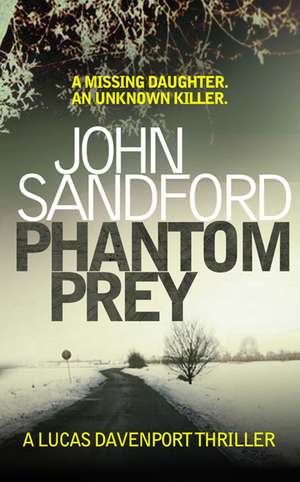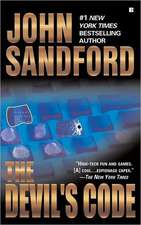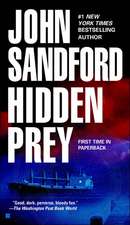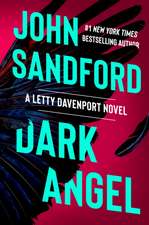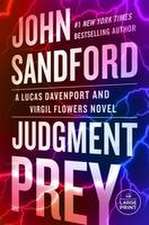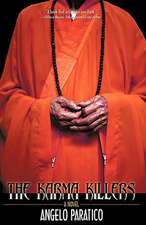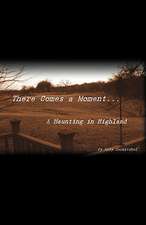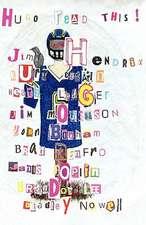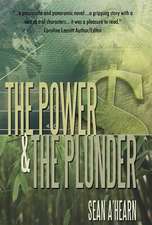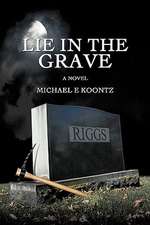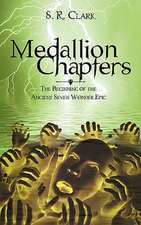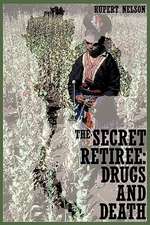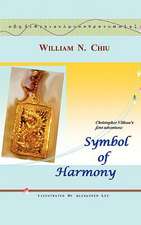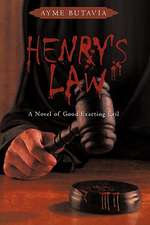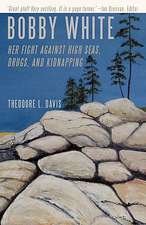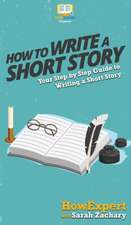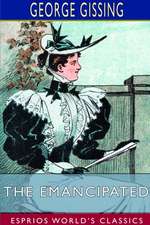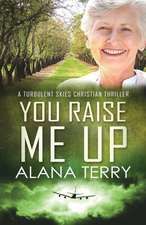Phantom Prey
Autor John Sandforden Limba Engleză Paperback – 5 mai 2009
When a wealthy widow returns to her luxurious home in an exclusive Minneapolis suburb to find blood everywhere and her daughter gone, she instantly suspects the involvement of the weird Goth crowd her daughter was always hanging around with. Then, with no sign of the widow's daughter, dead or alive, a second Goth is found slashed to death.
It's only when a third turns up dead that Lucas Davenport is reluctantly dragged into the case. But for all Davenport's expertise, the clues don't seem to add up. And then there's the young Goth who keeps appearing and disappearing. Who is she? Where does she come from - and, more importantly, where does she vanish to? Davenport suspects that there's something else going on here. Something very, very bad . . .
***READERS LOVE THE PREY SERIES***
'John Sandford knows all there is to know about detonating the gut-level shocks of a good thriller' The New York Times Book Review
'The best Lucas Davenport story so far. The man has a fine touch for outlaws' Stephen King on Golden Prey
'Sandford’s trademark blend of rough humor and deadly action keeps the pages turning until the smile-inducing wrap-up, which reveals the fates of a number of his quirky, memorable characters' Publishers Weekly on Golden Prey
'It appears there is no limit to John Sandford’s ability to keep new breath and blood flowing into his Lucas Davenport series. This is a series you must be reading if you are not already' Bookreporter.com
'Sandford has always been at the top of any list of great mystery writers. His writing and the appeal of his lead character are as fresh as ever' The Huffington Post
'Sandford is consistently brilliant' Cleveland Plain Dealer
| Toate formatele și edițiile | Preț | Express |
|---|---|---|
| Paperback (2) | 32.52 lei 24-36 zile | |
| Simon & Schuster – 5 mai 2009 | 32.52 lei 24-36 zile | |
| Berkley Books – 30 apr 2009 | 67.98 lei 3-5 săpt. |
Preț: 32.52 lei
Preț vechi: 108.56 lei
-70% Nou
Puncte Express: 49
Preț estimativ în valută:
6.22€ • 6.46$ • 5.19£
6.22€ • 6.46$ • 5.19£
Carte disponibilă
Livrare economică 07-19 martie
Preluare comenzi: 021 569.72.76
Specificații
ISBN-13: 9781847392053
ISBN-10: 1847392059
Pagini: 448
Dimensiuni: 111 x 178 x 36 mm
Greutate: 0.23 kg
Editura: Simon & Schuster
Colecția Simon & Schuster UK
Locul publicării:United Kingdom
ISBN-10: 1847392059
Pagini: 448
Dimensiuni: 111 x 178 x 36 mm
Greutate: 0.23 kg
Editura: Simon & Schuster
Colecția Simon & Schuster UK
Locul publicării:United Kingdom
Descriere
Lucas Davenport returns in this 18th instalment of the bestselling Prey series
Recenzii
"LUCAS DAVENPORT DEVOTEES WOULDN'T MISS IT FOR THE WORLD."
-St. Louis Post Dispatch
"INFINITELY CHILLING."
-Richmond Times Dispatch
"IMPRESSIVE."
-Washington Post
-St. Louis Post Dispatch
"INFINITELY CHILLING."
-Richmond Times Dispatch
"IMPRESSIVE."
-Washington Post
Extras
1
Something wrong here, a cold whisper of evil. The house was a modernist relic, glass and stone and redwood, sixty years old and gone creaky; not all haunted houses were Victorian. Sometimes at night, when she was alone, she’d feel a sudden coolness, as though somebody, or some thing, had just slipped by. This was different. She couldn’t pin it down, but it was palpable.
She thought about stepping back into the garage.
“Who’s there?” she called. She got nothing back but an echo.
The house was dark, except for desk lamps in the front room and in the study, which were triggered by photocells at dusk. She could hear the furnace running. Nothing else—but the hair on her forearms and the back of her neck stood upright. Some atavistic sense was picking up a threat. She looked to her right. The arming light on the security panel was steady, so the security system had been disarmed. That was decisive. The house should be empty, the security system should be armed.
She stepped back, moving quickly, around the nose of the Jaguar to the Mercedes. She yanked open the driver’s-side door, reached under the front seat to the storage bin, popped the lid, and lifted out the Ladysmith .38.
Stood listening again, the gun cool in her hand, and heavy. Couldn’t even hear the furnace, now. The Mercedes’s engine pinged, cooling down. The overhead garage lights were still on and she watched the door to the house. Something wrong, but the house felt empty.
Her nose twitched. She could smell exhaust from the car, but when she’d stepped through the door to the house, there’d been something else. A subtle stink that shouldn’t have been there. Not sweat, not body odor, not perfume, not flatulence, but something organic. Meat?
She had her purse over her shoulder, her cell phone right there. Call the police? What would she tell them? That something was not right? That something smelled a little funky? They’d think she was crazy.
She put her purse on the hood of the Jag, held the gun in front of her, like the handgun instructor had shown her. She was an athlete, and a professional athlete at that: swimming, dance, martial arts, weights, Pilates, yoga. The hard stuff: her body control was nearly perfect. She’d shot the eyes out of the gun- instructor’s bad- guy target.
He’d been mildly impressed, but only mildly. A cop for most of his life, he’d told her that every shooting he’d ever seen had been a screwup.
“The question is not whether you can hit something at seven yards. The question is whether you can sort out all the problems, when you’ve got a loaded gun in your hand,” he’d said, a rehearsed speech that might have been written on a 3×5 card. “You have no time, but you have to figure out what’s happening—what’s going on. To shoot or not to shoot: it all comes down to a tenth of a second, in the dark. You don’t want to shoot your kid or a neighbor. You don’t want to not shoot a junkie with a butcher knife coming for your throat.” There wouldn’t be a neighbor in the house. The neighborhood was private, standoffish. People drew their friends from their businesses, from their schools, not from the street. The house keeper was long gone.
Her daughter? Frances had the security code but she always called ahead.
She called out: “Francie?”
No response.
Again, louder. “Fran? Are you there?”
Starting to feel foolish, now. Then she remembered what the gun instructor had told her. “About the time you start to feel like an idiot, that’s when they’ll get you. If you’re scared enough to have the gun out, then the situation is serious enough that you can’t be abashed.”
She remembered the word. Abashed. Was she abashed?
She was back at the door. Kept the muzzle of the gun pointing straight ahead, called out, “Frances, I’ve got a gun, because I’m scared. Don’t jump out, if this is a joke. Frances?” She let go of the gun with her left hand, reached around the doorjamb, and flicked on the lights. The entry was clear and, as far as she could see, the kitchen. She was inside now, the house still giving off the empty feel. Edged forward.
The hair on her arms was up again and she reached inside the kitchen door and hit another block of lights. They came on all at once, three circuits’ worth, fifteen lights in all, the kitchen as brightly lit as a stage. She glanced behind her, at the garage, then back toward the dark door beyond the kitchen.
Not right; a few lizard- brain cells were screaming at her. Not right.
“Frances? Fran? Are you there? Helen? Are you still here, Helen?” Helen was the house keeper.
No answer. She let the gun drop to her side. Then, remembering what the cop said, brought it back up, and let the muzzle lead her through the house. Halfway through, she knew she was alone. There was no tension in the air, no vibration. She cleared the last bedroom, exhaled, smiled at her own foolishness.
This hadn’t happened before. There was something . . . She got to the kitchen, sniffed, and looked around. Put the gun on the counter, opened the refrigerator, pulled out the bag of pre- cut celery sticks, took out two and crunched them.
Huh.
Alyssa Austin leaned against the counter, a small woman, blond, fair-complected, but not delicate: she had a physical density to her face and hands that suggested the martial arts, or an extreme level of exercise. She looked at the gun on the counter, and half-smiled; it was dark and curved and weighted with presence, like a successful work of art. She was finishing the second celery stick when she noticed the dark streaks on the wallpaper at the edge of the hall that led from the kitchen to the dining room. The streaks were broom- straw- length and - breadth, splaying out from a center, dark but not black, like flower petals, or a slash from a watercolor brush. Not knowing exactly why, she stepped over and touched them— and felt the tackiness under her finger.
Pulled her finger back and found a spot of crimson. She knew instantly and without a doubt that it was blood, and relatively fresh. Saw a small, thinner streak farther down the wall. Backed away . . .
Scared now, picked up the gun, backed into the kitchen, groped for the phone, punched in 9- 1- 1. She did it with a bloody finger, not realizing, leaving red dots on the keys. The operator, an efficient- sounding woman, asked, “Is this an emergency?”
“There’s blood in my house,” she said.
“ Are you in danger?” the operator asked.
“No, I don’t . . . I don’t . . .”
“Is this Mrs. Austin?”
“Yes.” She didn’t know how the operator had gotten her name, didn’t think about it. “I just came home.”
“Go someplace safe, close by.”
“I need the police.”
“We are already on the way,” the operator said. “Officers will be there in about a minute. Are you safe?”
“I uh . . . don’t know.” She thought, The police. I should put the gun away. “Tell them . . . Tell them I’m going to the garage. I’m going to lock myself in the car. The garage door is up.”
“Okay. That would be good,” the operator said. “Don’t hang up. Just drop the phone and go to the car. We should be there in less than a minute now.”
She dropped the phone and backed toward the garage.
She could hear sirens in the distance—and not another thing.
The cops went in with guns in their hands, cleared the house, looked at the blood and called for a crime- scene crew. Alyssa went looking for her house keeper, and found her. Helen was utterly confused by the blood; it hadn’t been there when she left.
The crime- scene crew, from the Minnesota Bureau of Criminal Apprehension, spent two days in the house. They found more signs of blood, on the tiles in the kitchen and hallway, enough that it had apparently been mopped up. Alyssa and the cops spent the next two days looking for Frances. They found her car, found her last grocery list, but they never could find her. Then the blood tests came back from the lab: it was Frances’s blood, all right.
According to the lab techs, there’d been a pool of blood on the floor, which had been cleaned up with a product called Scrubbing Bubbles bathroom cleaner and paper towels—there were little spit- ball, or blood-ball, remnants from the towels stuck in the cracks of the Mexican tiles. The blood spatters on the wall had simply been missed by the killer or killers, who hadn’t noticed the thin sprays of blood entwined in the floral pattern of the wallpaper.
Frances was gone, and probably dead, and they all knew it.
Alyssa cried, sporadically and unpredictably, for four weeks, caught in the bureaucracy of mysterious death, a slow- motion nightmare.
No body, just the blood—and the cops coming around, and the reporters, and the cameras, and then the lawyers and the accountants, trying to work through the law. What to do about Frances’s car? I’m sorry to have to ask at a time like this but Frances’s belongings are still in the apartment, and if she’s not going to be able to pay the rent next month we have a young couple who are looking . . .
When her husband, Hunter, had been killed, he’d managed to die with his typical neatness. Trusts in order, will in place, lists of assets and debts, a file of real estate holdings, careful records of stock- purchase dates, garnished with instructions for everybody. He’d been a control freak right to the end. He’d probably never felt a thing, his silly seaplane dropping like a rock into the Ontario woods, witnesses all around. When he’d died, she’d been stricken, but had recovered, and knew even on the day of his death that she would recover. They were married, but they’d been psychologically split for years, living separate lives in separate rooms; with a little sex now and then. Frances, though, was different.
She hadn’t had her life yet; she hadn’t died—if she were dead—doing something voluntarily. And she was Alyssa’s blood. What ever their conflicts—and they’d mostly concerned the father and husband, Hunter—they would have been worked through. They only needed time, and they hadn’t gotten it.
So Alyssa cried, short violent jags at unexpected moments. And she looked for her daughter, the only ways she knew: she called people, politicians, who called the cops, who whispered back that something was going on here. . . . The politicians apologized and temporized and shuffled away. She’d become a liability.
And she looked in the stars. She did her astrological charts, using the latest software, she talked with a master on the East Coast, who wondered aloud if Frances might still be alive. His chart for the girl showed a passage of darkness, but not death. Nothing that big.
“Alive?”
“It’s a possibility that has to be examined,” he said, in tones portentous even for a wizard of the Zodiac. “I see an instability, a hovering, a waiting . . .”
The cards said the same thing. Alyssa had picked up the tarot as a teenager, believed in the cards, used them at all- important business junctures—and she’d done so well. So well.
And though the cards and the stars agreed that Frances, or some part of her, remained in this sphere, there was never a sign of her.
The burden, the insanity of it all, was crushing. Alyssa lived on Xanax and, at night, on Ambien. Then she began to take Xanax to lay down a base for the Ambien; and then a glass of wine as a base for the Xanax, as a base for the Ambien; and still she didn’t sleep. She rolled and turned and her mind cranked twentyfour hours a day, a long circle of jangled thoughts. Sometimes, during the day, from the corner of her eye, she’d see Frances sitting on a couch. She’d come downstairs in the middle of the night, having heard Fran’s music playing on the stereo, only to have it fade as she came closer.
She felt cool breezes where there should be no drafts, as though someone had walked past her. And she saw omens. Crows on a fence, symbols of death, staring at her unafraid, but mute. A fireball in the sky, when she happened to be thinking of Frances. Fran’s face in crowds, always turning away from her, and gone when she hurried to them.
Was Frances alive? Or dead?
Or somewhere in between? Fairy had some of the answers, or believed she did.
Alyssa was a blond, good- hearted, New Age modern woman. Fairy was dark, obsessive, Pre- Raphaelite— and where Alyssa floundered, trying to comprehend, Fairy knew in a moment what had happened to Frances, and focused on revenge.
Fairy stepped out of the shower, toweled off as she walked into the bedroom. When she was dry, she threw the towel on the bed and chose Obsession from the row of perfume bottles on the dressing table. She touched the bottle to her neck and the top of her breasts, judging herself in the dressing mirror as she did.
She didn’t call herself Fairy; others did. But it fit—with a pair of gossamer wings, she could have been Tinker Bell’s evil twin.
Then Loren appeared. “Looking good. Really, really good. Your ass is . . .”
“I don’t have time to fool around, I’ve got to get dressed,” Fairy said. “But you can watch me.”
“I know, time to go,” Loren said. “I’ll watch you undress, later.”
She looked straight into his hungry dark eyes, patted her breasts with the flats of her fingers, fluffing up her nipples, and got dressed: black panty hose, a light thermal vest for warmth, a soft black skirt, a black silk blouse threaded with scarlet, tight over the vest. Back to the mirror, she painted on the lipstick, dark as raw liver, penciled her eyebrows, touched up her lashes; smacked her lips like women do, adjusting everything. Arranged the fall of the hair: like a black waterfall around her shoulders.
“Wonderful.”
“Thank you.”
“That’s what you get, when you sleep with an aesthete.”
Fairy walked back to the dressing closet and took out the short black leather jacket, pulled it on: the jacket gave her shoulders, and a stance. Two- inch black heels gave her height. Ready now.
“The knife?” Loren asked.
“Here.” She touched the breast pocket on the jacket; could feel it in there, new from Target, hard black plastic and soft gray steel, sharpened to a razor’s edge.
“Then—let’s go.” Loren smiled, teeth flashing, his face a white oval above his dark clothing, and Fairy reached out, took his hand, and they went.
Loren was the one who’d found Frances’s killers; together they’d scoured her laptop, her photographs— thousands of them, taken with a cell phone and a point-and- shoot Nikon, some of them stored electronically, but hundreds of them printed out, stacked in baskets, stuck to the front of her refrigerator, piled in drawers: a record of her life, from which the killers emerged.
There were three: “I can actually feel her hand on their shoulders,” he told her. “These are the people who did it.”
The three were scattered through the stacks of photos, but they were all together in one of them. The photo had been taken at a party of some kind, the three people peering at the camera, laughing.
“You’re sure?” Fairy asked.
“Never more. Blood on their hands, missus,” he said.
“I want them,” she said.
“Revenge,” he said. He smacked his lips. “It’s so sweet; revenge tastes like orange juice and champagne.”
Fairy laughed at the metaphor and said, “Everything with you goes back to the senses, doesn’t it? Sight, sound, touch, taste, smell . . .”
“That’s all there is, missus. . . .”
THEY BOUGHT A car to hunt from—bought it at a roadside person- to- person sales spot, along Highway 36. Gave the seller an envelope full of cash, drove away in the car, an aging Honda Prelude. Never registered the change, never bought insurance; kept it out of sight. They began to scout, to make schedules, to watch. Early on, it became apparent that the bartender was at the center of the plot—the fulcrum of Frances’s Goth world. He took in people, places, events, and plans, and passed them on. He knew what was happening, knew the history.
Fairy talked to him three times: once on the sidewalk, when he passed her, looking her over, and she passed by and then turned and called, “Excuse me, are you Mr. Ford?”
He walked back to her and grinned, shoulders up, hands tucked in his jeans pockets. A charmer. “Yeah. Have I seen you around?”
“I was over at the A1 a few weeks ago with Frances Austin,” Fairy said. “Did you hear about her?”
“I did. There’s been a lot of talk.”
“I can’t imagine what happened,” Fairy said, shaking her head. “Some people say drugs, some people say she must have had a secret lover.”
“She used to smoke a little, I know that,” Ford said. “But . . . I’m not sure she even had her own dealer. She didn’t smoke that much. I can’t believe it was drugs. Must’ve been something else.”
“The police think . . . I don’t know. Because she was one of us”—Fairy patted her black blouse—“that maybe somebody sent her to the other side, to see . . . what would happen.”
“Well, that’s scary,” Ford said. “What’s your name?”
She made up the name on the spot: “Mary. Janson. Mary Janson.” They shook hands. “Some of the people have tried to get in touch with her. On the other side.”
Ford’s eyebrows went up, and he smiled. “No luck, huh?”
“You don’t believe?”
“Oh, you know. I used to, I guess. Used to talk about it, anyway. With me, it’s more of a hang- out thing,” he said. He looked away. “I used to listen to the people talk about . . . you know. Life, death, crossing over. It’s interesting, but, I don’t know. Too depressing, if you do it for a long time.”
Fairy shook her head again, the black hair swirling around her shoulders: “It bothers me so much. If I could find out why she’s gone, what happened to her, I’d be fine. I could sleep.”
Ford leaned closer to her: “If you want my opinion, it was a money deal.”
“A money deal?”
“You knew her pretty well?” Ford asked.
“I did,” Fairy said.
“Then you gotta know she was rich.”
“I knew she was well- off.”
“Rich,” Ford insisted. “She told me that when her father was killed, she inherited, like, two million. She already had money from trusts her parents set up when she was small. She said they put in, like, ten thousand each, every year; during all those big stock market boom times in the nineties, she had a million of her own, before she inherited. So I know she had that much.”
“A lot more than I knew,” Fairy said.
“We joked about starting a club,” Ford said. His eyes drifted away, seeing another reality. “She’d back it, I’d run it. We’d bring in some dark music; change the scene around here. It would have been a moneymaker.”
“Sounds wonderful,” Fairy said.
A rueful smile: “Yeah: she gets killed, and my life flashes in front of my eyes.” Ford looked at his watch: “Shoot. I gotta go, I’m late for work. Are you going to be around? Mary Janson?”
“I’ll be around,” Fairy said.
He leaned closer again. “You smell wonderful.”
She twiddled her fingers at him, and went on her way. “I’ll see you at the A1.”
Loren had been leaning against an old elm, listening. He caught Fairy down the sidewalk and said, “You smell wonderful.” “I do.”
“You heard what he said.”
“Money,” she said. They seemed, now, to pick things out of each other’s minds.
“She must’ve talked it around,” Loren said. “You know how she liked to talk—and so, what happened is, she got some of these people all cranked up about starting a club, a new scene, but you know how conservative she really was; so it comes to the moment when she has to produce the cash, and she backs away.”
Fairy frowned: “How do you know so much about her?”
“Why, from you,” Loren said. “All you do is talk about her. All day, all the time.” Back home, in bed, they made love in his cold, frantic way. Loren’s fingernails were an inch long, left scratches on her rib cage and thighs. And afterward, she said, “Ford knows.”
“Yes, he does. We should see him again; and some of the others. Patricia . . .”
“I don’t think she’d be involved,” Fairy said, tentatively.
“She’s involved,” Loren said, sitting up, the sheets falling to his waist, showing off his rib cage. His body was slender as a rake. “I can feel it. She was jealous of Frances. Her parents broke up, they don’t care whether she lives or dies. She’s over there by herself, nothing to do, no place to go. Frances had two parents who loved her, and the money. So the fat girl gets involved in this club thing, she’s going to be cool, she’s going to be a club own er, or operator, hang out with the bands . . . and Frances finally says she can’t have it. Can’t have any of it. Jealousy and hate.”
“Maybe.”
“For sure,” Loren said. “As far as I’m concerned, she’s on the list.”
“We have more scouting,” Fairy said. “We have Dick Ford, we have Roy Carter, and Patty . . .”
“So we take a week, and think. Then we move again. If we don’t, the energy will fritter away. Just fritter away.”
She talked to Ford again, for ten minutes, at the A1, passing through. And finally, a third time, just at closing. Went to the bar, drank a beer, and he touched her hand, and touched it again, and the knife was like the Sword of Freya in her belt. When she finished the beer, as Ford was calling to the patrons to “Drink up and go home,” she drifted out the back door and looked back, caught his eyes with hers.The alley was paved with red bricks, covered with the grime of a century of wear; she wanted to lean on something while she waited, but everything was dirty, so instead, she wandered in little circles, rocked back and forth, hoping that nobody else would come through the door. A thought: I could leave right now. She could leave, and nothing would happen. She could sell the car—or not, who’d care?—and be done with it.
She toyed with the thought, then let it drift away. Dropped her hand to the knife. She’d spent some time with it, sharpening the edge until it was like a razor. She yawned: nervous.
Then Ford came through the door. He might have worked on his smile, inside, in the restroom mirror, because it was perfect—an effort to generate a bit of wry charm, in an uncertain situation with a good- looking woman. “So, what’s up?”
He was wearing a leather jacket, unzipped, which was good, and beneath it, a canvas shirt. She got close and let him feel her smallness, her cuddliness, while her right hand slid along the handle of the knife. “I can’t stay away from the Frances Austin thing,” she said. “I thought you . . . could tell me about it.”
“Frances Austin?” He frowned: not what he expected. “You’re sort of stuck on that, huh?”
There was one light in the alley, and they were almost beneath it. She caught a corner of his jacket sleeve, and tugged him closer to the open end of the alley, toward the street, but deeper into the dark. Turned him, set him up against the wall, pressed into him, said, “You were her friend. You must have some ideas about what happened.”
“No, I really don’t. . . . Not so much.”
She whispered, “Don’t give me that bullshit,” and she jammed the knife into his gut, just about at the navel, and then, as she’d imagined it, pulled it up toward his heart, the blade cutting more easily than she’d expected, and she put all her muscle into it, up on her tiptoes, using both hands on the knife handle. Ford swung his arms at her, but they were soft and straight, like zombie arms, uncoordinated, shock with pain, and she moved around them and pulled on the knife, pulled it up to his breastbone, and then out.
He slumped back against the dirty wall, staring at her, made gargling sounds, his hands stretching down toward the earth, and then he slumped over sideways and fell on his side, and spewed blood.
She squatted, listened to him die, then wiped the knife on his shirt and spit on him: “That’s for Frances,” she said.
She walked away, down the empty alley, carrying the knife. Got in the car, drove six blocks in silence, until Loren said, “He’s gone. I felt him go.”
“Yes.”
“Pull over.”
“Why?” But she pulled over.
“Because I’m gonna fuck you,” Loren said.
And he did, and when the orgasm washed over her, it smelled purely of fresh blood.
Something wrong here, a cold whisper of evil. The house was a modernist relic, glass and stone and redwood, sixty years old and gone creaky; not all haunted houses were Victorian. Sometimes at night, when she was alone, she’d feel a sudden coolness, as though somebody, or some thing, had just slipped by. This was different. She couldn’t pin it down, but it was palpable.
She thought about stepping back into the garage.
“Who’s there?” she called. She got nothing back but an echo.
The house was dark, except for desk lamps in the front room and in the study, which were triggered by photocells at dusk. She could hear the furnace running. Nothing else—but the hair on her forearms and the back of her neck stood upright. Some atavistic sense was picking up a threat. She looked to her right. The arming light on the security panel was steady, so the security system had been disarmed. That was decisive. The house should be empty, the security system should be armed.
She stepped back, moving quickly, around the nose of the Jaguar to the Mercedes. She yanked open the driver’s-side door, reached under the front seat to the storage bin, popped the lid, and lifted out the Ladysmith .38.
Stood listening again, the gun cool in her hand, and heavy. Couldn’t even hear the furnace, now. The Mercedes’s engine pinged, cooling down. The overhead garage lights were still on and she watched the door to the house. Something wrong, but the house felt empty.
Her nose twitched. She could smell exhaust from the car, but when she’d stepped through the door to the house, there’d been something else. A subtle stink that shouldn’t have been there. Not sweat, not body odor, not perfume, not flatulence, but something organic. Meat?
She had her purse over her shoulder, her cell phone right there. Call the police? What would she tell them? That something was not right? That something smelled a little funky? They’d think she was crazy.
She put her purse on the hood of the Jag, held the gun in front of her, like the handgun instructor had shown her. She was an athlete, and a professional athlete at that: swimming, dance, martial arts, weights, Pilates, yoga. The hard stuff: her body control was nearly perfect. She’d shot the eyes out of the gun- instructor’s bad- guy target.
He’d been mildly impressed, but only mildly. A cop for most of his life, he’d told her that every shooting he’d ever seen had been a screwup.
“The question is not whether you can hit something at seven yards. The question is whether you can sort out all the problems, when you’ve got a loaded gun in your hand,” he’d said, a rehearsed speech that might have been written on a 3×5 card. “You have no time, but you have to figure out what’s happening—what’s going on. To shoot or not to shoot: it all comes down to a tenth of a second, in the dark. You don’t want to shoot your kid or a neighbor. You don’t want to not shoot a junkie with a butcher knife coming for your throat.” There wouldn’t be a neighbor in the house. The neighborhood was private, standoffish. People drew their friends from their businesses, from their schools, not from the street. The house keeper was long gone.
Her daughter? Frances had the security code but she always called ahead.
She called out: “Francie?”
No response.
Again, louder. “Fran? Are you there?”
Starting to feel foolish, now. Then she remembered what the gun instructor had told her. “About the time you start to feel like an idiot, that’s when they’ll get you. If you’re scared enough to have the gun out, then the situation is serious enough that you can’t be abashed.”
She remembered the word. Abashed. Was she abashed?
She was back at the door. Kept the muzzle of the gun pointing straight ahead, called out, “Frances, I’ve got a gun, because I’m scared. Don’t jump out, if this is a joke. Frances?” She let go of the gun with her left hand, reached around the doorjamb, and flicked on the lights. The entry was clear and, as far as she could see, the kitchen. She was inside now, the house still giving off the empty feel. Edged forward.
The hair on her arms was up again and she reached inside the kitchen door and hit another block of lights. They came on all at once, three circuits’ worth, fifteen lights in all, the kitchen as brightly lit as a stage. She glanced behind her, at the garage, then back toward the dark door beyond the kitchen.
Not right; a few lizard- brain cells were screaming at her. Not right.
“Frances? Fran? Are you there? Helen? Are you still here, Helen?” Helen was the house keeper.
No answer. She let the gun drop to her side. Then, remembering what the cop said, brought it back up, and let the muzzle lead her through the house. Halfway through, she knew she was alone. There was no tension in the air, no vibration. She cleared the last bedroom, exhaled, smiled at her own foolishness.
This hadn’t happened before. There was something . . . She got to the kitchen, sniffed, and looked around. Put the gun on the counter, opened the refrigerator, pulled out the bag of pre- cut celery sticks, took out two and crunched them.
Huh.
Alyssa Austin leaned against the counter, a small woman, blond, fair-complected, but not delicate: she had a physical density to her face and hands that suggested the martial arts, or an extreme level of exercise. She looked at the gun on the counter, and half-smiled; it was dark and curved and weighted with presence, like a successful work of art. She was finishing the second celery stick when she noticed the dark streaks on the wallpaper at the edge of the hall that led from the kitchen to the dining room. The streaks were broom- straw- length and - breadth, splaying out from a center, dark but not black, like flower petals, or a slash from a watercolor brush. Not knowing exactly why, she stepped over and touched them— and felt the tackiness under her finger.
Pulled her finger back and found a spot of crimson. She knew instantly and without a doubt that it was blood, and relatively fresh. Saw a small, thinner streak farther down the wall. Backed away . . .
Scared now, picked up the gun, backed into the kitchen, groped for the phone, punched in 9- 1- 1. She did it with a bloody finger, not realizing, leaving red dots on the keys. The operator, an efficient- sounding woman, asked, “Is this an emergency?”
“There’s blood in my house,” she said.
“ Are you in danger?” the operator asked.
“No, I don’t . . . I don’t . . .”
“Is this Mrs. Austin?”
“Yes.” She didn’t know how the operator had gotten her name, didn’t think about it. “I just came home.”
“Go someplace safe, close by.”
“I need the police.”
“We are already on the way,” the operator said. “Officers will be there in about a minute. Are you safe?”
“I uh . . . don’t know.” She thought, The police. I should put the gun away. “Tell them . . . Tell them I’m going to the garage. I’m going to lock myself in the car. The garage door is up.”
“Okay. That would be good,” the operator said. “Don’t hang up. Just drop the phone and go to the car. We should be there in less than a minute now.”
She dropped the phone and backed toward the garage.
She could hear sirens in the distance—and not another thing.
The cops went in with guns in their hands, cleared the house, looked at the blood and called for a crime- scene crew. Alyssa went looking for her house keeper, and found her. Helen was utterly confused by the blood; it hadn’t been there when she left.
The crime- scene crew, from the Minnesota Bureau of Criminal Apprehension, spent two days in the house. They found more signs of blood, on the tiles in the kitchen and hallway, enough that it had apparently been mopped up. Alyssa and the cops spent the next two days looking for Frances. They found her car, found her last grocery list, but they never could find her. Then the blood tests came back from the lab: it was Frances’s blood, all right.
According to the lab techs, there’d been a pool of blood on the floor, which had been cleaned up with a product called Scrubbing Bubbles bathroom cleaner and paper towels—there were little spit- ball, or blood-ball, remnants from the towels stuck in the cracks of the Mexican tiles. The blood spatters on the wall had simply been missed by the killer or killers, who hadn’t noticed the thin sprays of blood entwined in the floral pattern of the wallpaper.
Frances was gone, and probably dead, and they all knew it.
Alyssa cried, sporadically and unpredictably, for four weeks, caught in the bureaucracy of mysterious death, a slow- motion nightmare.
No body, just the blood—and the cops coming around, and the reporters, and the cameras, and then the lawyers and the accountants, trying to work through the law. What to do about Frances’s car? I’m sorry to have to ask at a time like this but Frances’s belongings are still in the apartment, and if she’s not going to be able to pay the rent next month we have a young couple who are looking . . .
When her husband, Hunter, had been killed, he’d managed to die with his typical neatness. Trusts in order, will in place, lists of assets and debts, a file of real estate holdings, careful records of stock- purchase dates, garnished with instructions for everybody. He’d been a control freak right to the end. He’d probably never felt a thing, his silly seaplane dropping like a rock into the Ontario woods, witnesses all around. When he’d died, she’d been stricken, but had recovered, and knew even on the day of his death that she would recover. They were married, but they’d been psychologically split for years, living separate lives in separate rooms; with a little sex now and then. Frances, though, was different.
She hadn’t had her life yet; she hadn’t died—if she were dead—doing something voluntarily. And she was Alyssa’s blood. What ever their conflicts—and they’d mostly concerned the father and husband, Hunter—they would have been worked through. They only needed time, and they hadn’t gotten it.
So Alyssa cried, short violent jags at unexpected moments. And she looked for her daughter, the only ways she knew: she called people, politicians, who called the cops, who whispered back that something was going on here. . . . The politicians apologized and temporized and shuffled away. She’d become a liability.
And she looked in the stars. She did her astrological charts, using the latest software, she talked with a master on the East Coast, who wondered aloud if Frances might still be alive. His chart for the girl showed a passage of darkness, but not death. Nothing that big.
“Alive?”
“It’s a possibility that has to be examined,” he said, in tones portentous even for a wizard of the Zodiac. “I see an instability, a hovering, a waiting . . .”
The cards said the same thing. Alyssa had picked up the tarot as a teenager, believed in the cards, used them at all- important business junctures—and she’d done so well. So well.
And though the cards and the stars agreed that Frances, or some part of her, remained in this sphere, there was never a sign of her.
The burden, the insanity of it all, was crushing. Alyssa lived on Xanax and, at night, on Ambien. Then she began to take Xanax to lay down a base for the Ambien; and then a glass of wine as a base for the Xanax, as a base for the Ambien; and still she didn’t sleep. She rolled and turned and her mind cranked twentyfour hours a day, a long circle of jangled thoughts. Sometimes, during the day, from the corner of her eye, she’d see Frances sitting on a couch. She’d come downstairs in the middle of the night, having heard Fran’s music playing on the stereo, only to have it fade as she came closer.
She felt cool breezes where there should be no drafts, as though someone had walked past her. And she saw omens. Crows on a fence, symbols of death, staring at her unafraid, but mute. A fireball in the sky, when she happened to be thinking of Frances. Fran’s face in crowds, always turning away from her, and gone when she hurried to them.
Was Frances alive? Or dead?
Or somewhere in between? Fairy had some of the answers, or believed she did.
Alyssa was a blond, good- hearted, New Age modern woman. Fairy was dark, obsessive, Pre- Raphaelite— and where Alyssa floundered, trying to comprehend, Fairy knew in a moment what had happened to Frances, and focused on revenge.
Fairy stepped out of the shower, toweled off as she walked into the bedroom. When she was dry, she threw the towel on the bed and chose Obsession from the row of perfume bottles on the dressing table. She touched the bottle to her neck and the top of her breasts, judging herself in the dressing mirror as she did.
She didn’t call herself Fairy; others did. But it fit—with a pair of gossamer wings, she could have been Tinker Bell’s evil twin.
Then Loren appeared. “Looking good. Really, really good. Your ass is . . .”
“I don’t have time to fool around, I’ve got to get dressed,” Fairy said. “But you can watch me.”
“I know, time to go,” Loren said. “I’ll watch you undress, later.”
She looked straight into his hungry dark eyes, patted her breasts with the flats of her fingers, fluffing up her nipples, and got dressed: black panty hose, a light thermal vest for warmth, a soft black skirt, a black silk blouse threaded with scarlet, tight over the vest. Back to the mirror, she painted on the lipstick, dark as raw liver, penciled her eyebrows, touched up her lashes; smacked her lips like women do, adjusting everything. Arranged the fall of the hair: like a black waterfall around her shoulders.
“Wonderful.”
“Thank you.”
“That’s what you get, when you sleep with an aesthete.”
Fairy walked back to the dressing closet and took out the short black leather jacket, pulled it on: the jacket gave her shoulders, and a stance. Two- inch black heels gave her height. Ready now.
“The knife?” Loren asked.
“Here.” She touched the breast pocket on the jacket; could feel it in there, new from Target, hard black plastic and soft gray steel, sharpened to a razor’s edge.
“Then—let’s go.” Loren smiled, teeth flashing, his face a white oval above his dark clothing, and Fairy reached out, took his hand, and they went.
Loren was the one who’d found Frances’s killers; together they’d scoured her laptop, her photographs— thousands of them, taken with a cell phone and a point-and- shoot Nikon, some of them stored electronically, but hundreds of them printed out, stacked in baskets, stuck to the front of her refrigerator, piled in drawers: a record of her life, from which the killers emerged.
There were three: “I can actually feel her hand on their shoulders,” he told her. “These are the people who did it.”
The three were scattered through the stacks of photos, but they were all together in one of them. The photo had been taken at a party of some kind, the three people peering at the camera, laughing.
“You’re sure?” Fairy asked.
“Never more. Blood on their hands, missus,” he said.
“I want them,” she said.
“Revenge,” he said. He smacked his lips. “It’s so sweet; revenge tastes like orange juice and champagne.”
Fairy laughed at the metaphor and said, “Everything with you goes back to the senses, doesn’t it? Sight, sound, touch, taste, smell . . .”
“That’s all there is, missus. . . .”
THEY BOUGHT A car to hunt from—bought it at a roadside person- to- person sales spot, along Highway 36. Gave the seller an envelope full of cash, drove away in the car, an aging Honda Prelude. Never registered the change, never bought insurance; kept it out of sight. They began to scout, to make schedules, to watch. Early on, it became apparent that the bartender was at the center of the plot—the fulcrum of Frances’s Goth world. He took in people, places, events, and plans, and passed them on. He knew what was happening, knew the history.
Fairy talked to him three times: once on the sidewalk, when he passed her, looking her over, and she passed by and then turned and called, “Excuse me, are you Mr. Ford?”
He walked back to her and grinned, shoulders up, hands tucked in his jeans pockets. A charmer. “Yeah. Have I seen you around?”
“I was over at the A1 a few weeks ago with Frances Austin,” Fairy said. “Did you hear about her?”
“I did. There’s been a lot of talk.”
“I can’t imagine what happened,” Fairy said, shaking her head. “Some people say drugs, some people say she must have had a secret lover.”
“She used to smoke a little, I know that,” Ford said. “But . . . I’m not sure she even had her own dealer. She didn’t smoke that much. I can’t believe it was drugs. Must’ve been something else.”
“The police think . . . I don’t know. Because she was one of us”—Fairy patted her black blouse—“that maybe somebody sent her to the other side, to see . . . what would happen.”
“Well, that’s scary,” Ford said. “What’s your name?”
She made up the name on the spot: “Mary. Janson. Mary Janson.” They shook hands. “Some of the people have tried to get in touch with her. On the other side.”
Ford’s eyebrows went up, and he smiled. “No luck, huh?”
“You don’t believe?”
“Oh, you know. I used to, I guess. Used to talk about it, anyway. With me, it’s more of a hang- out thing,” he said. He looked away. “I used to listen to the people talk about . . . you know. Life, death, crossing over. It’s interesting, but, I don’t know. Too depressing, if you do it for a long time.”
Fairy shook her head again, the black hair swirling around her shoulders: “It bothers me so much. If I could find out why she’s gone, what happened to her, I’d be fine. I could sleep.”
Ford leaned closer to her: “If you want my opinion, it was a money deal.”
“A money deal?”
“You knew her pretty well?” Ford asked.
“I did,” Fairy said.
“Then you gotta know she was rich.”
“I knew she was well- off.”
“Rich,” Ford insisted. “She told me that when her father was killed, she inherited, like, two million. She already had money from trusts her parents set up when she was small. She said they put in, like, ten thousand each, every year; during all those big stock market boom times in the nineties, she had a million of her own, before she inherited. So I know she had that much.”
“A lot more than I knew,” Fairy said.
“We joked about starting a club,” Ford said. His eyes drifted away, seeing another reality. “She’d back it, I’d run it. We’d bring in some dark music; change the scene around here. It would have been a moneymaker.”
“Sounds wonderful,” Fairy said.
A rueful smile: “Yeah: she gets killed, and my life flashes in front of my eyes.” Ford looked at his watch: “Shoot. I gotta go, I’m late for work. Are you going to be around? Mary Janson?”
“I’ll be around,” Fairy said.
He leaned closer again. “You smell wonderful.”
She twiddled her fingers at him, and went on her way. “I’ll see you at the A1.”
Loren had been leaning against an old elm, listening. He caught Fairy down the sidewalk and said, “You smell wonderful.” “I do.”
“You heard what he said.”
“Money,” she said. They seemed, now, to pick things out of each other’s minds.
“She must’ve talked it around,” Loren said. “You know how she liked to talk—and so, what happened is, she got some of these people all cranked up about starting a club, a new scene, but you know how conservative she really was; so it comes to the moment when she has to produce the cash, and she backs away.”
Fairy frowned: “How do you know so much about her?”
“Why, from you,” Loren said. “All you do is talk about her. All day, all the time.” Back home, in bed, they made love in his cold, frantic way. Loren’s fingernails were an inch long, left scratches on her rib cage and thighs. And afterward, she said, “Ford knows.”
“Yes, he does. We should see him again; and some of the others. Patricia . . .”
“I don’t think she’d be involved,” Fairy said, tentatively.
“She’s involved,” Loren said, sitting up, the sheets falling to his waist, showing off his rib cage. His body was slender as a rake. “I can feel it. She was jealous of Frances. Her parents broke up, they don’t care whether she lives or dies. She’s over there by herself, nothing to do, no place to go. Frances had two parents who loved her, and the money. So the fat girl gets involved in this club thing, she’s going to be cool, she’s going to be a club own er, or operator, hang out with the bands . . . and Frances finally says she can’t have it. Can’t have any of it. Jealousy and hate.”
“Maybe.”
“For sure,” Loren said. “As far as I’m concerned, she’s on the list.”
“We have more scouting,” Fairy said. “We have Dick Ford, we have Roy Carter, and Patty . . .”
“So we take a week, and think. Then we move again. If we don’t, the energy will fritter away. Just fritter away.”
She talked to Ford again, for ten minutes, at the A1, passing through. And finally, a third time, just at closing. Went to the bar, drank a beer, and he touched her hand, and touched it again, and the knife was like the Sword of Freya in her belt. When she finished the beer, as Ford was calling to the patrons to “Drink up and go home,” she drifted out the back door and looked back, caught his eyes with hers.The alley was paved with red bricks, covered with the grime of a century of wear; she wanted to lean on something while she waited, but everything was dirty, so instead, she wandered in little circles, rocked back and forth, hoping that nobody else would come through the door. A thought: I could leave right now. She could leave, and nothing would happen. She could sell the car—or not, who’d care?—and be done with it.
She toyed with the thought, then let it drift away. Dropped her hand to the knife. She’d spent some time with it, sharpening the edge until it was like a razor. She yawned: nervous.
Then Ford came through the door. He might have worked on his smile, inside, in the restroom mirror, because it was perfect—an effort to generate a bit of wry charm, in an uncertain situation with a good- looking woman. “So, what’s up?”
He was wearing a leather jacket, unzipped, which was good, and beneath it, a canvas shirt. She got close and let him feel her smallness, her cuddliness, while her right hand slid along the handle of the knife. “I can’t stay away from the Frances Austin thing,” she said. “I thought you . . . could tell me about it.”
“Frances Austin?” He frowned: not what he expected. “You’re sort of stuck on that, huh?”
There was one light in the alley, and they were almost beneath it. She caught a corner of his jacket sleeve, and tugged him closer to the open end of the alley, toward the street, but deeper into the dark. Turned him, set him up against the wall, pressed into him, said, “You were her friend. You must have some ideas about what happened.”
“No, I really don’t. . . . Not so much.”
She whispered, “Don’t give me that bullshit,” and she jammed the knife into his gut, just about at the navel, and then, as she’d imagined it, pulled it up toward his heart, the blade cutting more easily than she’d expected, and she put all her muscle into it, up on her tiptoes, using both hands on the knife handle. Ford swung his arms at her, but they were soft and straight, like zombie arms, uncoordinated, shock with pain, and she moved around them and pulled on the knife, pulled it up to his breastbone, and then out.
He slumped back against the dirty wall, staring at her, made gargling sounds, his hands stretching down toward the earth, and then he slumped over sideways and fell on his side, and spewed blood.
She squatted, listened to him die, then wiped the knife on his shirt and spit on him: “That’s for Frances,” she said.
She walked away, down the empty alley, carrying the knife. Got in the car, drove six blocks in silence, until Loren said, “He’s gone. I felt him go.”
“Yes.”
“Pull over.”
“Why?” But she pulled over.
“Because I’m gonna fuck you,” Loren said.
And he did, and when the orgasm washed over her, it smelled purely of fresh blood.
